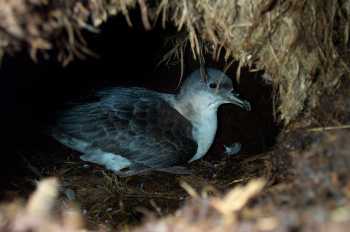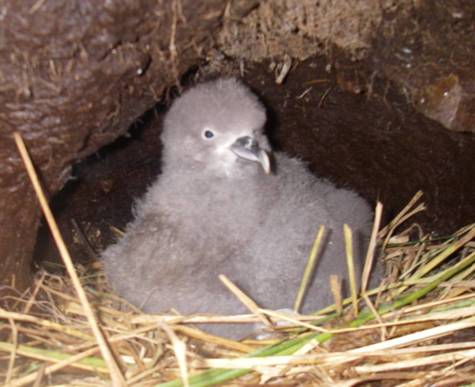The ACAP-listed Grey Petrel Procellaria cinerea is listed as endangered by the Tasmanian Threatened Species Act of 1995 and is considered to be globally Near Threatened. Grey Petrels were first recorded as breeding on Australia's Macquarie Island in 1900 but an 80-year absence followed and they were considered to be no longer present. However, in 1999 three burrows were found with evidence of recently-fledged chicks. The timing of this discovery coincided with the final stages of the feral cat Felis catus eradication programme, suggesting that recolonization of the island by the species has occurred. The last cat was killed in 2000 (click here for an earlier ACAP Latest News story).


Grey Petrels on Macquarie Island
Photographs courtesy of Department of Primary Industries, Parks, Water and Environment
Since then Grey Petrel breeding numbers have been increasing on Macquarie, with the 2011 season for this winter-breeding species the best ever since recording begun in 1999. A new high of 109 confirmed breeding attempts (out of 152 active burrows) in the three monitoring colonies of Brothers Point, Green Gorge and North Head has resulted in 89 chicks fledging (82%) which contrasts with the previous year's figures of 48 breeding attempts (out of 123 active burrows), resulting in a breeding success of only 54% (26 fledglings).
Macquarie Island's Grey Petrel population is expected to continue to increase as a result of the recent and ongoing efforts by the Macquarie Island Pest Eradication Project to remove introduced European Rabbits Oryctolagus cuniculus, Black or Ship Rats Rattus rattus and House Mice Mus musculus from the island, which have already lead to a recovery of the island's vegetation as the following recent quote from the island's weekly news shows.
"In the absence of rabbits, the flora is flourishing. New seedlings are sprouting everywhere, and there are no sharp, little teeth nibbling them off anymore. Stands of once heavily grazed Macquarie Island Cabbage Stilbocarpa polaris and the Silver-leaf Daisy Pleurophyllum hookeri are flowering profusely." (click here).
Selected References:
Schultz, M., Robinson, S. & Gales, R.[P.] 2006. Breeding of the Grey Petrel (Procellaria cinerea) on Macquarie Island: population size and nesting habitat. Emu 105: 323-329.
Springer, K. 2011. Planning processes for eradication of multiple pest species on Macquarie Island - an Australian case study. In: Veitch, C.R., Clout, M.N. & Towns, D.R. (Eds). Island Invasives: Eradication and Management. Proceedings of the International Conference on Island Invasives. Gland: World Conservation. pp. 228-232.
With thanks to Rachael Alderman and Rosemary Gales, Biodiversity Conservation Branch, Department of Primary Industries, Parks, Water and Environment, Hobart, Tasmania, Australia for information and photographs.
John Cooper, ACAP Information Officer, 25 January 2012

 English
English  Français
Français  Español
Español